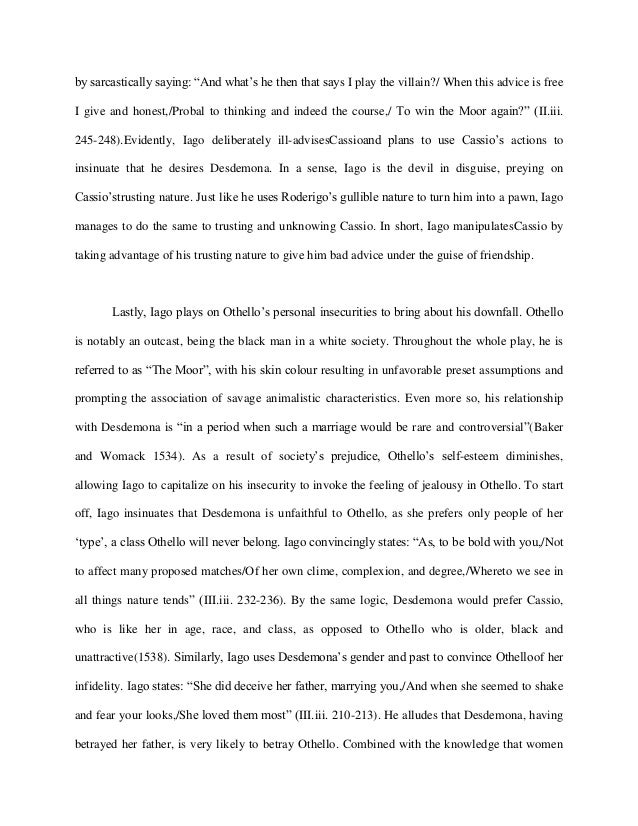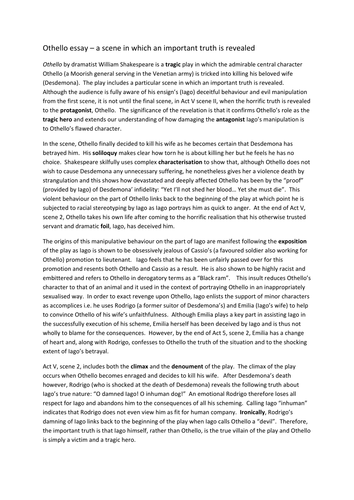Grade 12 Othello Study Guide
Othello study guide contains a biography of William Shakespeare, literature essays, a complete e-text, quiz questions, major themes, characters, and a full summary and analysis.
Othello Study Guide
The plot of Shakespeare's is largely taken from Giraldi Cinthio's Gli Hecatommithi, a tale of love, jealousy, and betrayal; however, the characters, themes, and attitudes of the two works are vastly different, with Shakespeare's play being a more involved study of human nature and psychology. One of the major deviations from the source, is the motivation of the figure. Cithio's Iago was driven to revenge when refused to have an affair with him; Iago's motivations are not nearly so plain in Shakespeare's version. Othello also touches upon a major issue in Europe of this time period; the intermingling of Muslim religion and culture with the West. Written just a century after the Muslims were driven out of Spain as a part of the Reconquista, there are obvious threads of hostility within the play about Othello's Moorish origins, and his differences in religion and culture. The hostility between the West and the East is also shown in the conflict between Venice and the Turks; the Christian Venetians want to protect Christendom from the influence of the Muslim Turks, and ironically, Moorish Othello is the one sent to complete this mission. Othello is considered to be a prime example of Aristotelian drama; it focuses upon a very small cast of characters, one of the smallest seen in Shakespeare's body of work, has few distractions from the main plot arc, and concentrates on just a few central themes.
As such, it is one of the most intense and focused plays Shakespeare wrote, and has also enjoyed a great amount of popularity from the Jacobean period to the present day. The character of Iago is a variation on the Vice figure found in earlier morality plays; he deviates from this model because of his lack of a clear motivation, and because of his portrayal as a very malignant figure. However, Iago is less of a character than a changeable device for the plot, and in this sense, he is a clear descendant of the omnipresent 'vice' figure. Iago's great cunning, manipulative abilities, and almost supernatural perception mean that he is a very formidable foe, and this makes Othello's fall seem even more inevitable and tragic. One reason for the overwhelming popularity of the play throughout the ages is that it focuses on two people who defied society in order to follow their own hearts. Shakespeare scholar Walter Cohen cites the popularity of Othello during times of great rebellion and upheaval; the play was most popular during the European wars of the mid-19th century, the fall of Czarist Russia, and also during World War II in America.
These productions tended to emphasize the nobility and love of Othello and Desdemona, and made their fall seem more tragic and ill-deserved. Taken from The Norton Shakespeare, introduction to Othello by Walter Cohen. How To Cite in MLA Format J. Joseph Ward May 31, 2014; Christine McKeever ed. 'Othello Study Guide'. GradeSaver, 29 September 2014 Web.
Shakespeare's father was a glove-maker, and Shakespeare received no more than a grammar school education. He married Anne Hathaway in 1582, but left his family behind around 1590 and moved to London, where he became an actor and playwright.
He was an immediate success: Shakespeare soon became the most popular playwright of the day as well as a part-owner of the Globe Theater. His theater troupe was adopted by King James as the King's Men in 1603.
Shakespeare retired as a rich and prominent man to Stratford-upon-Avon in 1613, and died three years later. From the eleventh to the fifteenth century, Catholics battled to re-conquer Spain from the Islamic Arabs and Berbers, or Moors, who had successfully occupied it since the 900s. The struggle inspired intense prejudice and suspicion that lasted well after the Moors were overthrown.



Othello Study Guide Answers
Philip III of Spain expelled 300,000 'Moriscos' from the Iberian (Spanish) peninsula not long after Shakespeare finished Othello, in 1609. In England during Shakespeare's time, views regarding 'Moors' were slightly more complex because of strong anti-Catholic sentiment in England and English fears of invasion by the Spanish. In fact, England maintained independent trade relationships with 'Moorish' Northern Africa, despite Spanish and Portuguese protest. The English slave trade also brought blacks to Europe, from mid-sixteenth century onward. Queen Elizabeth herself founded The Barbary Company, formally institutionalizing this trade; in addition, she received a delegation of Moroccan diplomats in 1600. However, the English still felt a strong suspicion of Islam: Elizabeth issued a degree expelling Moors from Africa and Spanish 'Moriscos' from the boundary of England in 1599 and 1601.
Shakespeare's primary source for Othello was Un capitano moro ('A Moorish Captain'), one of one hundred short stories in the collection Gli Hecatommithi, published by the Italian, Cinthio. Cinthio's story provides the backbone for Shakespeare's plot, although Shakespeare introduces some minor new characters (such as Brabantio and Roderigo) and other alterations—for instance, in Cinthio's version, Iago's motive for revenge against Othello is that he formerly loved and was rejected by Desdemona. There are also similarities between Othello, 'A Moorish Captain,' and a story by the name of 'The Three Apples' narrated by Scheherezade in the Thousand and One Nights. Moor or less?
The Kubota V2203 is a vertical, water-cooled, 4-cycle diesel engine with a capacity of 39.9HP at 2800RPM. V2203 Operator Manual (1828.2 KB) You. View online or download Kubota V2203-B Workshop Manual. Manuals; Brands; Kubota Manuals; Engine; V2203-B; Kubota V2203-B Manuals. PDF workshop manual includes service and repair information, technical service instructions, circuits and diagrams for Kubota diesel engines V2203-DI. 2018 kubota v2203 diesel engine parts manual.
In Elizabethan England, the term 'Moor' could be used to refer to a wide range of non-European persons, including black Africans, North Africans, Arabs, and even Indians. References to Othello's origins throughout the play are contradictory and ambiguous Iago calls Othello a 'Barbary horse' (1.1.110); Barbary was an area in Africa between Egypt and the Atlantic Ocean. Roderigo, however, calls him 'thick-lips' (1.1.65-6), suggesting that he may come from further south on the African continent.
Brabantio calls him 'sooty' (1.2.70); Othello, along with numerous other characters, refers to himself as 'black.' It is impossible to know now exactly what Shakespeare or his audience would have thought a 'Moor' is.